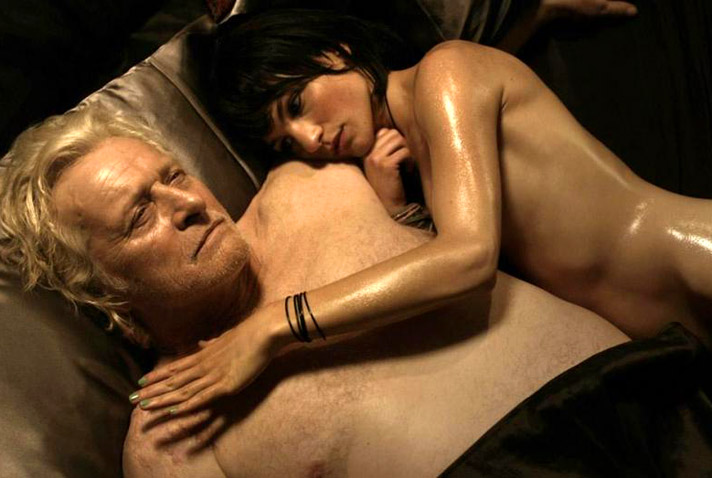
In the cluttered tenement
buildings of Greece exists Bianca (Manuela Martelli) and Tomas (Luigi Ciardo),
teenage siblings attempting to survive in the wake of their parents’ death.
Bianca is the responsible one, cooking and cleaning for her younger brother,
trying to complete her studies while laboring at the local salon, desperate for
a chance to cut hair instead of merely washing customers. Tomas, dimmer by more
than half, shirks his studies by spending days working at a local gym, a job
that involves unusual hours and shady clients with clasped hands brandishing wads
of bills. It’s bad enough they have to deal with raging hormones without
supervision: when Tomas falls asleep to the sounds of pirated cable, Bianca
grabs the remote and finds a quieter channel that allows her to slumber in his
arms, mere clicks away from the illegal pornography Tomas sought when he paid
for the package himself. Sex is in the air, ready to pry their two-person
family apart. This is “Il Futuro,” where every gesture is pregnant with psychological complexity and tragic regret.

That specific crowbar emerges
in the form of two stupid, indistinguishable grunts that follow Tomas from work
and passive-aggressively assimilate themselves into this parentless household.
As they eat the food and use the beds, they pitch the beautiful, blossoming
Bianca what is likely their latest in a collection of airtight plots. Up on a
mountain, there lives a once-king, they embellish, a former strongman named El
Maciste. Bianca is skeptical (her seduction of one of these brutes feels like a
listless concession, not a genuine act of passion), but the mythical nature of Maciste intrigues her. The plan for Bianca to infiltrate Maciste’s life and
nab a box loaded with his life savings seems less seductive; the film appropriately adopts her point of view, in that the crime would be an afterthought, but the experience would be pure intoxication.
Maciste’s mansion is like a
gothic castle, forever night as the walls are swallowed by the shadows. Like a
sacrificial lamb, the attractive Bianca is offered up to Maciste, who grunts
and growls after his prize. He is blind and elderly, but there’s the sense he’s
still got potions of both Frankenstein and Frankenstein’s monster inside him.
The great Rutger Hauer plays this former Mr. Universe like lightning sans
thunder: when he moves, he is a force of nature, emerging from darkness to
sweep Bianca off her feet. She had not been told he was blind, but given his
physicality, it is irrelevant. More than once, he stands across the room from
her and asks if she is naked. Never does the answer matter, because soon he has
her in his monstrous grip. Director Alicia Scherson manages to capture these moments like an animal ambushing its prey; it’s erotic without vulgarity, still something of a novelty in today’s arthouse cinema.

With the introduction of
Maciste about halfway through “Il Futuro,” Scherson’s film goes from a
mildly affecting melodrama to something else entirely. Leaving and returning to
the world of Maciste is like entering and exiting a portal. Time doesn’t move
much in Maciste’s arms, and when Tomas’ pushy friends inquire about the man’s
money, she can only shrug as she watches his old films, where he was a George
Reeves-type movie star. Maciste never leaves his home, and when Bianca is not
there, he might as well turn to stone, waiting to be awakened by his teenaged
lover. Their lovemaking is playful, immensely physical but gentle. Forced to be
the head of the household at home, she instead relishes disrobing for her
gentleman, being ravaged and tossed around like his plaything. There seems to
be no real future in “Il Futuro,” as Bianca is perfectly aware that Maciste
will only place her back on the shelf when he’s done, and that he knows his sentimental
recollections and storytelling with this younger girl merely keep his feet
firmly placed in the past.
Scherson’s film never gets a
firm grasp on life away from Maciste: raccoon-eyed Martelli is an arresting
presence, though she is merely reactive in a hostile, overly-masculine environment.
And as Maciste looms, Bianca’s relationship with her brother feels dismissed, as
is the awkward incestuous tension that arises is blunted by her romantic
interests in the old man, as well as Tomas’ impotence against his two
deceptively friendly tormentors. It seems like a statement that “Il Futuro”
presents simple but intriguing conflicts that nonetheless resolve
anti-climactically, denying us an organic end. Scherson ultimately blinds us
not unlike Maciste, tossing us into traffic, hoping that we gather our senses:
it’s not that we can see, but that we try to. [B+]






I've come across that first picture a few times before, and it never fails to make me laugh out loud. Man, it looks like they used about three gallons of oil on that poor girl.